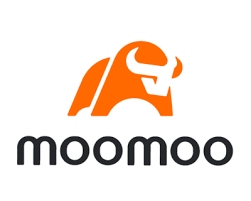The battle of the discount brokers: Moomoo vs. Webull which reigns supreme?

In this Moomoo vs. Webull review we will take a look at these two popular discount brokers. We will compare investment options, fees and commissions, trading tools, customer service, and account options to help you pick the right online brokerage.
Let’s get into it.
Quick Comparison
Overall Rating | ||
Trading Fees |
|
|
Minimum Investment | $1 | $1 |
Account Types |
|
|
Investment Options |
|
|
Customer Serivce |
|
|
What is Moomoo?
Moomoo is a newer discount brokerage platform that provides online trading in stocks, options, exchange-traded funds (ETFs), and international stocks. It’s a subsidiary of Futu Holdings Limited, a Chinese company that operates in the financial technology industry.

Moomoo aims to offer a user-friendly and innovative platform that enables individual investors to easily access financial markets and manage their portfolios. The platform provides features such as commission-free trades, real-time market data, advanced charting tools, and educational resources.
Moomoo also offers additional features and services such as margin trading, IPO access, and a social community for investors to share ideas and insights.
Go Deeper: Read our full Moomoo Review
What is Webull?

Webull is a mobile-first investing platform that offers commission-free trading for stocks, options, and ETFs. The company also offers crypto trading, short selling, and access to international markets, complimented by helpful charting features and technical analysis tools for active traders.
The platform is designed to be intuitive and easy to navigate, making it ideal for experienced and novice investors. Its user-friendly mobile app makes it easy to monitor real-time market data and trade on the go.
Webull was founded in 2017 and is headquartered in New York City.
The company boasts 2.7 million monthly users.
Go Deeper: Read our full Webull Review
PROs and CONs
Moomoo PROS
- Low Margin Rate. 6.85%, one of the lowest rates out of all brokers.
- Foreign Exchange. Moo moo is one of the few discount brokers who offers access to the foreign exchange markets.
- Advanced Technical Analysis. With over 63 technical indicators, 38 drawing tools, and the ability to create your own technical indicators with 190+ presets makes MooMoo is different than other brokerages.
Moomoo CONS
- No covered calls trading. They do not offer the ability to sell covered call options, which could be a drawback for income-oriented investors.
- No interest on uninvested cash. Uninvested cash does not earn interest, which means you’re missing out on decent pocket change with interest rates hovering at 5%.
- Some investment options unavailable. No cryptocurrencies, Bonds, CDs, mutual funds. Not a huge issue for may investors, but individuals should take note.
Webull PROS
- Nano Options. Webull allows you to trade nano index `options`, which are 1/100th of the size of a regular option, enabling retail investors with limited resources to trade options.
- Cash Management. New customers can earn up to 5.8% on uninvested cash.
- Incredible User Experience. The Webull desktop and mobile app blow the others out of the water with UI aesthetics, customizability, and ease of use.
Webull CONS
- No Crypto Wallet. Webull does not currently offer a crypto wallet, meaning you cannot transfer your crypto out of Webull. It shouldn’t be an issue if you are buying and selling crypto for profit.
- High Margin Rate. If you want to trade on margin, Webull’s rate starts at 9.49%, considerably higher than Moomoo’s margin rate of 6.85%.
Moomoo vs. Webull: Comparison
Below we compare several important categories to consider before opening a new brokerage account online.
Let’s look at Webull and Moomoo’s investment options, fees, commissions, customer support, research analysis, tools, and account options to see how these discount brokers stack up against each other.
Let’s get into it.
Investment Options
Winner: Webull
Webull offers a more well-rounded investment offering compared to MooMoo. While both online brokers offer US stocks, options, and ETFs, Webull also offers 44 cryptocurrencies and fractional shares.
Webull Investment Options:
- US Stocks
- Options
- Exchange-traded funds (ETFs)
- American Depository Receipts(ADRs)
- 44 Cryptocurrencies from Bitcoin to Dogecoin
- OTC stocks
- Fractional shares
- IPOs of companies going public
No bonds, mutual funds, forex, Webull also offers a cash management account where new users can earn up to 5.8% for 30 days, Moomoo does not offer any cash management features.
MooMoo Investment Options
- US Stocks
- International Stocks (Hong-Kong and Chinese Listed)
- ADRs
- OTC stocks
- Forex (Foreign Exchange)
- Options (No covered calls)
- Exchange-traded funds (ETFs)
- Fractional shares
- IPOs of companies going public
Moomoo does not offer cryptocurrencies, no covered call options, bonds, or mutual funds.
While a lack of fixed income and mutual fund offerings is not uncommon among discount brokers, not offering cryptocurrencies or covered call options trading puts Moomoo at a significant disadvantage compared to Webull, especially among active traders.
Fees and Commissions
Winner: Webull
Webull is the clear winner in this category because they do not any platform fees, and many options trades are commission free. Meanwhile, Moomoo charges $0.65 per options trade, and a $0.99 per trade platform fee.
Webull charges $0 commissions for stocks and ETFs, and most options trade, except for certain index options such as VIX, SPX, and XSP are also commission-free. There is also a 1% markup on cryptocurrency trades and small regulatory fees that may apply across all asset classes.
Webull Fees:
- Stocks, ETFs, Options: $0 (except some index options)
- Index Option Fees: $0.55 per contract (VIX, SPX, SPX)
- Cryptocurrency: 1% mark-up
- Margin Trading: Webull allows users to borrow money from the brokerage to buy securities. The interest rate charged on margin borrowing varies depending on the amount borrowed and the type of security but starts at 9.49%
- Short Selling: Webull charges a fee for short selling, which is selling a security you do not own with the expectation that its price will fall. The fee varies depending on the stock and the market conditions.
- Transfer Fees: $75 fee for transferring your account to or from another brokerage.
- Account Inactivity: If a user’s account is inactive for more than 12 months, Webull charges a $10 inactivity fee per month.
Moomoo Fees:
Moomoo also does not charge any fees for stocks and ETFs but does charge $0.65 per option contract a $0.99 per trade platform fee.
- Stocks: $0 Commission
- ETFs: $0 Commission
- Options: $0.65 per contract
- Futures: $0
- Platform Fee: $0.99 per order
- Margin Trading: Starting at 4.85%
- Transfer Fees: $75 per stock
Customer Support & Service
Winner: Tie
Discount brokers are notoriously known for having less than ideal customer service and support.
That said, Moomoo and Webull offer customer service support via phone (during market hours, and e-mail, chat, and social media.
Neither platform offers phone support after regular trading hours, so it’s a tie in the customer support and service category.
Research & Analysis Tools
Winner: Webull
Webull and Moomoo both offer a wide range of trading and research tools such as real-time market data, charting tools, technical indicators, research reports, webinars, news feeds, and trading alerts.

However, Webull has a more comprehensive suite of trading and research tools with additional features such as Level 2 market data, customizable trading interface, wider range of technical indicators, and a more extensive library of educational resources and research reports.

Account Options
Winner: Webull
Webull is the clear winner in the Account Options category.
Webull offers individuals the ability to invest through a taxable brokerage, traditional IRA, Roth, and also a roll-over IRA.
Meanwhile, Moomoo only offers a taxable brokerage account, limiting investors’ ability to take advantage of tax-advantaged retirement accounts.
Safety and Security
Winner: Tie
Webull and Moomoo offer industry-standard safety and security features.
When it comes to safety and security, both platforms take various measures to protect their clients’ personal and financial information.
Webull is a member of the Securities Investor Protection Corporation (SIPC), which provides insurance protection up to $500,000 for each customer’s securities and cash held in a brokerage account. Webull also uses advanced encryption technology to protect customers’ information and prevent unauthorized access.
Moomoo, on the other hand, is a subsidiary of Futu Holdings Limited, which is regulated by the Securities and Exchange Commission (SEC) and the Financial Industry Regulatory Authority (FINRA). Like Webull, Moomoo is also a member of the SIPC, which provides insurance protection for customers’ securities and cash.
Both Webull and Moomoo also have two-factor authentication (2FA) options, which require users to enter a unique code generated by their mobile device in addition to their password when logging into their accounts. This helps prevent unauthorized access to their accounts.
Overall, both Webull and Moomoo take security seriously and have measures in place to protect their customers’ personal and financial information.
User Interface
Winner: Webull
Overall, Webull has a more modern and sleek design for its desktop and mobile platforms with greater options for customization, while Moomoo has a more simplistic design with less customization available.
For example, Webull allows for greater customization of the trading interface by offering the ability to rearrange sections of the watchlist, newsfeed, and research tools.
On desktop devices, the MooMoo platform has a more traditional design, with a top navigation bar that provides access to different sections of the platform, including the trading screen, account information, a news feed, and research tools.
The trading screen provides real-time market data, advanced charting tools, and options trading capabilities. Th trading screen is a bit crowded compared to Webull.

Design
Webull has a modern and sleek design that is easy on the eyes, with a blue and white color scheme and a customizable trading interface. Moomoo, on the other hand, has a more simplistic design with a black and white color scheme.
Navigation
Both platforms have a user-friendly interface with intuitive navigation. Webull has a tabbed navigation menu that allows users to quickly switch between different sections of the app, such as the trading platform, account information, and research tools. Moomoo also has a similar navigation menu that allows users to quickly access the trading platform, research tools, and account information.
Customization
Webull allows users to customize the trading interface by adding and rearranging different sections of the platform, such as the watchlist, trading widget, and news feed. Moomoo, on the other hand, has limited customization options with a fixed layout of the trading platform.
Trading Widgets
Webull offers customizable trading widgets that can be added to the trading interface, allowing users to access real-time market data, news, and research tools. Moomoo also offers similar trading widgets but with fewer options for customization.
Who Should Use These Platforms?
Moomoo is good for…
- Experienced traders who want to take advantage of the ability to trade forex, and international stocks, or want to trade on margin taking advantage of Moomoo’s low margin rate.
Webull is good for…
- Experienced or beginner traders who want to take advantage of advanced charting and technical analysis tools.
The Bottom Line
Webull and Moomoo offer several advantages and disadvantages, depending on your investment goals. For example, the ability to trade forex and international stocks could be a significant advantage for some investors.
At the same time, the wide variety of account options and investment offerings could be more advantageous to some investors.
Moomoo does not offer cryptocurrencies, no covered calls options, bonds, or mutual funds.



